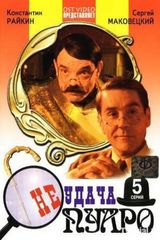
The Murder of Roger Ackroyd 1
2002-11-06 | Mystery,Comedy | 5 episodes1 Season
Episode
Episode 1 (2002)
Dr. Sheppard loves to write detective stories. Often he does not sleep at night, he lingers until the morning, pondering the plots of detective stories and how best to present them to his readers. He decides to start another story by the fact that in his hometown it often rains and thunderstorms thunder. And it is precisely on such terrible nights that crimes occur that will then be unraveled, using all your ability to reason, correctly link evidence and testimony, which invariably lead to a brilliant solution to the mystery, which at first seemed unsolvable. That night, for some reason, Mrs. Ferard died in her bed. A police inspector investigates the death of Ferar, and Sheppard notices scattered white tablets on the floor by the bed of the deceased woman, which he hands over to the inspector for analysis. But just yesterday, Sheppard saw Mrs. Ferard at the train station, accompanied by Ralph Payton!

Episode 2 (2002)
Dr. Sheppard and the butler Parker enter Mr. Roger Ackroyd’s office and find him dead. Roger was stabbed in the neck with a knife and killed for quite some time, so the killer managed to escape far enough. Sheppard asks to call the police, and he quickly does what he had to do, without touching either the body of the murdered person or the dagger. Soon the murdered secretary and Major Blend arrive. Sheppard notices two letters on the floor, but Mrs. Ferra’s blue envelope is gone. He wants to talk about it, but the captain of the police enters the office, and Sheppard bites his tongue. The police are wondering if this could be an accident or suicide? No, this is obvious. Then the version of the robbery is considered, but it does not seem to be suitable either - nothing was missing from Ackroyd’s office. But on the windowsill there are clear traces of the killer - he came here and went out the window.

Episode 3 (2002)
Sheppard is very pleased that fate sent him such a talented detective as Hercule Poirot. Walking with a friend along the huge estate of the deceased, Poirot tries to notice any little things, such as even those not related to the crime. In the gazebo, Poirot finds himself under the bench and hides the goose feather shaft to his cane. From a wicker basket, Poirot removes a scrap of fabric that clings to it, possibly a handkerchief. However, scarves never starch, and this fabric clearly bears the remains of starch. At the pond, friends notice Major Blend and Flora, who confess Blend in their feelings, although she considers her behavior reprehensible. Flora tells Blend that today the attorney has announced the conditions of the will. Uncle left her 20 thousand, and this means freedom for her. She no longer has to humiliate herself, to lie, to pretend to be grateful.

Episode 4 (2002)
Poirot claims: Sheppard's sister Carolina is a very outstanding woman. Thanks to her, now Poirot has in his hands a complete set of all kinds of rumors, and at the same time very valuable. Why didn't Sheppard tell everything from the start? After all, someone else could see Ralph in the forest, not only Carolina. Poirot invites the doctor to visit him, where he can hear the brilliant observations of the famous detective regarding the murder of Mr. Ackroyd. The offender did not enter the house, therefore, someone left the house to him. And it’s most convenient to meet in the arbor, where Poirot found a piece of feather and a piece of cambric. The maid was absent for too long - to leave, you need much less time than half an hour. Ralph needed money and went in the evening to Mr. Ackroyd. But he did not kill him. However, it was Ralph who left the window open, and then this way the killer got into Ackroyd’s office.

Episode 5 (2002)
In addition to the inspector, Dr. Sheppard and Hercule Poirot are present at the interrogation of the detainee suspected of killing Charles Kent. To deny that Charles was on Ackroyd’s estate is useless. First, Sheppard recognized his voice - that evening a stranger asked him how to get to a well-known address. Secondly, Poirot shows irrefutable evidence that Charles was in the gazebo. Under the bench, he lost an empty goose feather, where he kept drugs. Now the pen cavity is empty, but any examination will confirm that it is a drug container. Charles recalls that the newspaper indicated the exact time of the murder - from a quarter to ten to ten in the evening. And at a quarter to ten, he had already made a scandal in an eatery a mile from the house where the murder occurred, witnesses can confirm this. Charles went on a date to the estate, with whom - this does not concern anyone.

Cast
View Live Cast Profile
Photo


